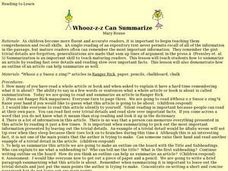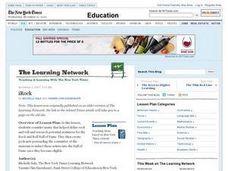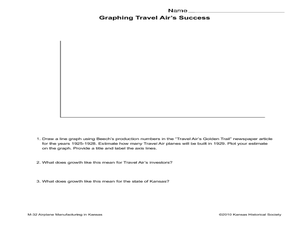Curated OER
Nazis Flying Saucers – Film Sparks UFO Debate
Young scholars explore the aircraft used in World War II. In this World History lesson, students read an article that describes a "flying saucer" created by the Nazi's. Upon completion of the reading, young scholars answer questions on...
Curated OER
MFL: Dangerous Driving
Students discuss why speed limits are important for safety of others. They examine public advertisements aimed at reducing the amount of deaths on the road. They read an article about traffic accidents and answer questions. They write an...
Curated OER
Love Them or Leave Them?
Students describe their pet and their feelings towards it and record their descriptive phrases on the board. They arrange comments on a spectrum from negative to positive. They read the article The Ambivalent Bond With a Ball of Fur and...
Curated OER
How Much Radiation is Around You?
Learners examine the use, misuse and fear of radiation. They read an article about radiation on food and discuss the positives and negatives of this process. They answer questions to complete the activity.
Curated OER
Rusyns Survive Time in Central & Eastern Europe
Tenth graders study the different ethnicities in Europe. In this Eastern Europe ESL lesson, 10th graders read an article and complete guided questions. Students participate in a debate.
Curated OER
Information Station
Students look through different print materials to information. In this information lesson plan, students look through the newspaper, magazines, and menus to practice finding such things as, the weather for the day, a picture of a nice...
Curated OER
Beauty in the Eye of the Scientist
Students research science's 10 most beautiful experiments and the historical periods in which these experiments were conducted. Then, students create magazine covers for issues of a fictional magazine.
Curated OER
Whooz-z-z Can Summarize
Students summarize an article by reading fast for details and reading slow for important facts. They practice outlining an article. They identify parts of an article such as the title and subheading. They write a short and concise...
Curated OER
Wilma Unlimited: Ambition and Goal Setting
Students listen as the teacher reads a book about an Olympic Gold Medal runner who made her big dream come true despite her hardships with polio. In this Wilma Rudolph instructional activity, students think about and discuss what...
Curated OER
Your Angle on the Story
Students review several articles on same current event, and then cover news issues themselves while assuming secret identities of various individuals who have vested interests in issue. Students write newspaper articles from these...
Curated OER
Covering the News
Students compare the coverage of two crime stories Using local or national newspapers, news magazines and other reference materials, each group trace the "unfolding" of two crime stories: The Laci Peterson investigation plus one students
Curated OER
Race to the Presses
Students explore how the news media relays information about race in the United States by creating collages from newspapers and magazines and by sharing their reflections about the responsibilities of the news media in covering...
Curated OER
Islamic Scientific Contributions to Civilization
Seventh graders explore several well documented artistic and scientific accomplishments that were discovered or perfected during The Golden Age of Islam. They are staff writers of a magazine who create a feature article about a topic...
Curated OER
Age-Old Concerns
Young scholars examine issues surrounding healthcare and specifically prescription drug coverage and the problems of state subsidy programs after reading and discussing the article, "States' Drug Subsidy Programs Have Troubles of Their...
Curated OER
Combing Through the News
Students use the Sean 'Puffy' Combs trial to compare how and why various media cover a news story differently.
Curated OER
Hurricane Katrina: You Be the Reporter
Learners work in a small group to create news stories, feature stories and editorials/letters to the editor and organize them in a podcast, video-based program, or newspaper/magazine focused on Hurricane Katrina.
Curated OER
The Maccabees and Their Place in Jewish History
Students assume the role of a journalist employed by time Warner to examine data about the long-lost cave contining the tombs of Maccabees. A two page spread is created for the weekend edition of the magazine.
Curated OER
The Height of Diplomacy
Students explore issues that might be discussed at the G8 summit meeting hosted by the U.S. after reading and discussing the article "World Leaders Get a Glimpse of America's High Life" from The New York Times. Students work in groups...
Curated OER
iRock
Students explore, listen to and analyze songs that helped define rock and roll music. They read and discuss the article, "They're All Oldies, Dad Included." Research on contemporary artists is conducted and then the students choose who...
Curated OER
Low Birthweight Infants
Ninth graders examine why there is a low birth-weight in infants. In this Social Studies lesson, 9th graders read articles on the low birth weight. Students debate the different strategies to help combat low birth weight.
Curated OER
Airplane Manufacturing in Kansas
Seventh graders determine how Kansas become a producer of airplanes. In this Kansas history lesson, 7th graders read selected Read Kansas! cards and articles. Students then discuss the primary sources they read regarding Wichita's growth...
Curated OER
Performance Poppers
Students examine the controversies surrounding the use of performance-enhancing supplements in sports by interviewing athletes and writing feature articles that compare the skills required to compete in different sports.
Curated OER
A Valid Conclusion? Testing and Reporting on Hypotheses Using the Scientific Method
Students explore importance of accuracy in reporting, focusing particularly on articles documenting scientific discoveries, and practice scientific method by conducting experiments to test and report on scientific hypotheses.
Curated OER
Slanted Sentences
Students examine biased words in news articles, suggest synonyms, then rewrite the sentences to demonstrate how word choice can alter meaning.























